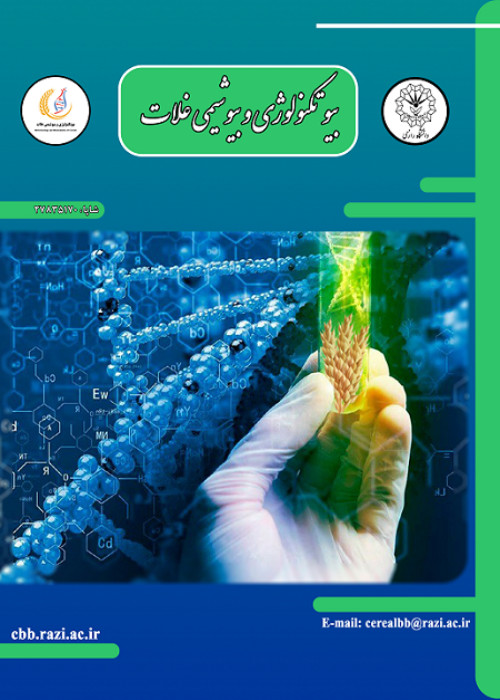The effects of Bacillus amyloliquefaciens inoculation on sensitive and tolerant wheat cultivar (Triticum aestivum L.) under salt stress conditions
Author(s):
Article Type:
Research/Original Article (دارای رتبه معتبر)
Abstract:
Introduction
The world's population is increasing, and the area of suitable agricultural land is not enough to supply food. Considering the nutritional value of wheat and its role in the food supply, poor soils and salty waters must be used for agriculture to solve the problem of food shortage in the world, so the use of salty waters for irrigation is inevitable in these conditions. Recently, special attention has been paid to the use of growth-promoting bacteria to moderate the effects of salinity. Microbial inoculation is better than other methods to reduce salinity stress because it minimizes production costs and environmental damage. This research was performed to investigate the effect of B. amyloliquefaciens inoculation on proline content, catalase (CAT), guaiacol peroxidase (GPx) activities, and protein expression in control and treatment plants.Materials and methods
A factorial experiment was arranged in a completely randomized design with three replications in the greenhouse of the School of Agriculture, Shiraz University, to investigate the effect of Bacillus bacteria (PGPR). The first factor was salinity levels (0 and 200 MM), the second factor was an application of bacteria (inoculated and non-inoculated), and the third factor was wheat genotypes (susceptible and resistant). The suspension containing Bacillus bacteria was injected into the soil during the application of salt stress. Twenty-four hours after salinity treatment, the leaves were sampled and used for all laboratory tests, such as measuring the activity of peroxidase enzymes, the amount of proline, and protein concentration. The data were analyzed using SAS software, and protein band pattern comparison was made by the SDS PAGE method.Results
The results showed that using bacteria under salt stress increased the proline and catalase enzyme activity in both sensitive and resistant genotypes. Nevertheless, the peroxidase enzyme did not increase under stress conditions in the resistant cultivar. It also increased the amount of total protein in the susceptible variety. The effect of bacteria on the one Hundred-Seeds weight was not significant, but since the weight of one hundred seeds is one of the growth parameters that hardly changes, the slightest change in it can be effective, which was observed in this project. Finally, applying this bacterium caused changes in the pattern of protein bands in susceptible and resistant cultivars under salinity stress and non-stress conditions. These changes included the removal of the protein band or its higher expression in different stress conditions compared to normal conditions.Conclusion
The plant inoculation by bacteria and its use several times in the roots region of sensitive and resistant wheat has positively affected biochemical properties. Applying these types of bacteria without harming the environment can be a practical method to control salinity stress and maintain optimal yield in salt soils. Control the signals received by the bacteria from the plant and the effects of the bacteria on the growth of the plant by manipulating the bacteria. It can be used as a suitable alternative to the complex and time-consuming methods of gene transfer to the plant.Keywords:
Language:
Persian
Published:
Journal of cereal Biotechnology and biochemistry, Volume:1 Issue: 4, 2023
Pages:
522 to 534
magiran.com/p2532496
دانلود و مطالعه متن این مقاله با یکی از روشهای زیر امکان پذیر است:
اشتراک شخصی
با عضویت و پرداخت آنلاین حق اشتراک یکساله به مبلغ 1,390,000ريال میتوانید 70 عنوان مطلب دانلود کنید!
اشتراک سازمانی
به کتابخانه دانشگاه یا محل کار خود پیشنهاد کنید تا اشتراک سازمانی این پایگاه را برای دسترسی نامحدود همه کاربران به متن مطالب تهیه نمایند!
توجه!
- حق عضویت دریافتی صرف حمایت از نشریات عضو و نگهداری، تکمیل و توسعه مگیران میشود.
- پرداخت حق اشتراک و دانلود مقالات اجازه بازنشر آن در سایر رسانههای چاپی و دیجیتال را به کاربر نمیدهد.
In order to view content subscription is required
Personal subscription
Subscribe magiran.com for 70 € euros via PayPal and download 70 articles during a year.
Organization subscription
Please contact us to subscribe your university or library for unlimited access!




